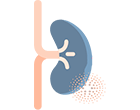Nephrology
Diagnostic test based on NGS of multiple genes associated to a disease, condition, or phenotype.


Alport Syndrome (AS) is a progressive hereditary renal disease characterized by sensorineural hearing loss, ocular abnormalities and increased risk of chronic kidney failure.
Bartter Syndrome is an autosomal recessive renal tubular disorder caused by a defective salt reabsorption in the thick ascending loop of Henle resulting in hypokalemia, hypochloremia, metabolic alkalosis, high renin and aldosterone with normal blood pressure.
Liddle syndrome is a genetic disorder characterized by low-renin hypertension that appears early in life. It is caused by mutations affecting the epithelial sodium channel (ENaC) located in the collecting duct of the nephron.
Meckel-Gruber Syndrome (MKS) is a lethal, autosomal recessive neurodevelopmental condition characterized by a triad of symptoms which are occipital encephalocele, large polycystic kidneys and postaxial polydactyly.
Nephrotic Syndrome (NS) is defined as the presence of nephrotic-range proteinuria with a low serum albumin level, edema and hypercholesterolemia, indicating damage to the glomerular filtration barrier. Nephrotic-range proteinuria is known as the loss of 3.5 grams or more per day of protein in the urine.
Polycystic Kidney Disease (PKD) is an inherited multisystemic and progressive disorder characterized by cyst formation and enlargement of the kidneys and other organs. Cysts are noncancerous round sacs containing fluid.
Primary Hyperoxaluria (PH) is a group of inherited metabolic diseases of the liver characterized by increased formation of calcium-oxalate stones in kidneys with the subsequent development of nephrolithiasis and chronic kidney disease.
Hemolytic Uremic Syndrome (HUS) is defined by the presence of microangiopathic hemolytic anemia, thrombocytopenia and acute kidney injury. It is one of the main causes of acute kidney injury in children. It is a clinically heterogeneous condition given the different etiologies of HUS that result in differences in presentation, management and outcome.